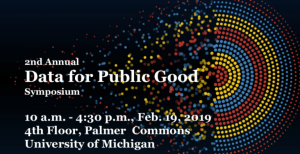Presented By: Michigan Institute for Data Science
The 2nd Annual Data for Public Good Symposium

Do you have experience in working alongside community partners in data analysis or program evaluation? Do you want to connect with others who are using their skills for public good? National efforts from organizations such as DataKind, Data Science for Social Good, and Statistics without Borders have been expanding in recent years as more individuals recognize their potential to impact social change. Great things can happen when individuals are empowered to dedicate time, resources, and knowledge to the pursuit of public good. Whether we work in the foreground or the background, we can all contribute to improving the lives of those around us.
Statistics in the Community (STATCOM), in collaboration with the Center for Education Design, Evaluation, and Research (CEDER) and the Community Technical Assistance Collaborative (CTAC), invite you to attend the 2nd Annual Data for Public Good Symposium hosted by the Michigan Institute for Data Science (MIDAS). The symposium showcase the many research efforts and community-based partnerships at U-M that focus on improving humanity by using data for public good. If you are interested in attending, please register in the link below.
Presenters:
- Partners for Preschool: The Added Value of Learning Activities at Home During the Preschool Year, Amanda Ketner, School of Education
- University-Community Partnership to Support Ambitious STEM Teaching: Leveraging University of Michigan expertise in education, research, and evaluation to support innovative, interactive teaching across the S.E. Michigan region and beyond, C. S. Hearn, Center for Education Design, Evaluation, and Research (CEDER)
- Open Data Flint, Stage II, Kaneesha Wallace, MICHR
- Research-Practice Partnerships at the Youth Policy Lab, A Foster, ISR Youth Policy Lab and School of Education
- The LOOP Estimator: Adjusting for Covariates in Randomized Experiments, Edward Wu, Statistics
- Barrier Busters: Unconditional Cash Transfers as a Strategy to Promote Economic Self-Sufficiency, Elise Gahan, School of Public Health
- Implementing Trauma-Informed Care at University Libraries, Monte-Angel Richardson, School of Social Work
- Why did the global crude oil price start to rise again after 2016?, Shin Heuk Kang, Economics
Poverty and economic hardship in Michigan communities: Data from the Michigan Public Policy Survey (MPPS), Natalie Fitzpatrick, Center for Local, State, and Urban Policy
Understanding Networks of Influence on U.S. Congressional Members’ Public Personae on Twitter, Angela Schopke, Chris Bredernitz, Caroline Hodge, School of Information
Statistics in the Community (STATCOM), in collaboration with the Center for Education Design, Evaluation, and Research (CEDER) and the Community Technical Assistance Collaborative (CTAC), invite you to attend the 2nd Annual Data for Public Good Symposium hosted by the Michigan Institute for Data Science (MIDAS). The symposium showcase the many research efforts and community-based partnerships at U-M that focus on improving humanity by using data for public good. If you are interested in attending, please register in the link below.
Presenters:
- Partners for Preschool: The Added Value of Learning Activities at Home During the Preschool Year, Amanda Ketner, School of Education
- University-Community Partnership to Support Ambitious STEM Teaching: Leveraging University of Michigan expertise in education, research, and evaluation to support innovative, interactive teaching across the S.E. Michigan region and beyond, C. S. Hearn, Center for Education Design, Evaluation, and Research (CEDER)
- Open Data Flint, Stage II, Kaneesha Wallace, MICHR
- Research-Practice Partnerships at the Youth Policy Lab, A Foster, ISR Youth Policy Lab and School of Education
- The LOOP Estimator: Adjusting for Covariates in Randomized Experiments, Edward Wu, Statistics
- Barrier Busters: Unconditional Cash Transfers as a Strategy to Promote Economic Self-Sufficiency, Elise Gahan, School of Public Health
- Implementing Trauma-Informed Care at University Libraries, Monte-Angel Richardson, School of Social Work
- Why did the global crude oil price start to rise again after 2016?, Shin Heuk Kang, Economics
Poverty and economic hardship in Michigan communities: Data from the Michigan Public Policy Survey (MPPS), Natalie Fitzpatrick, Center for Local, State, and Urban Policy
Understanding Networks of Influence on U.S. Congressional Members’ Public Personae on Twitter, Angela Schopke, Chris Bredernitz, Caroline Hodge, School of Information
Explore Similar Events
-
Loading Similar Events...
